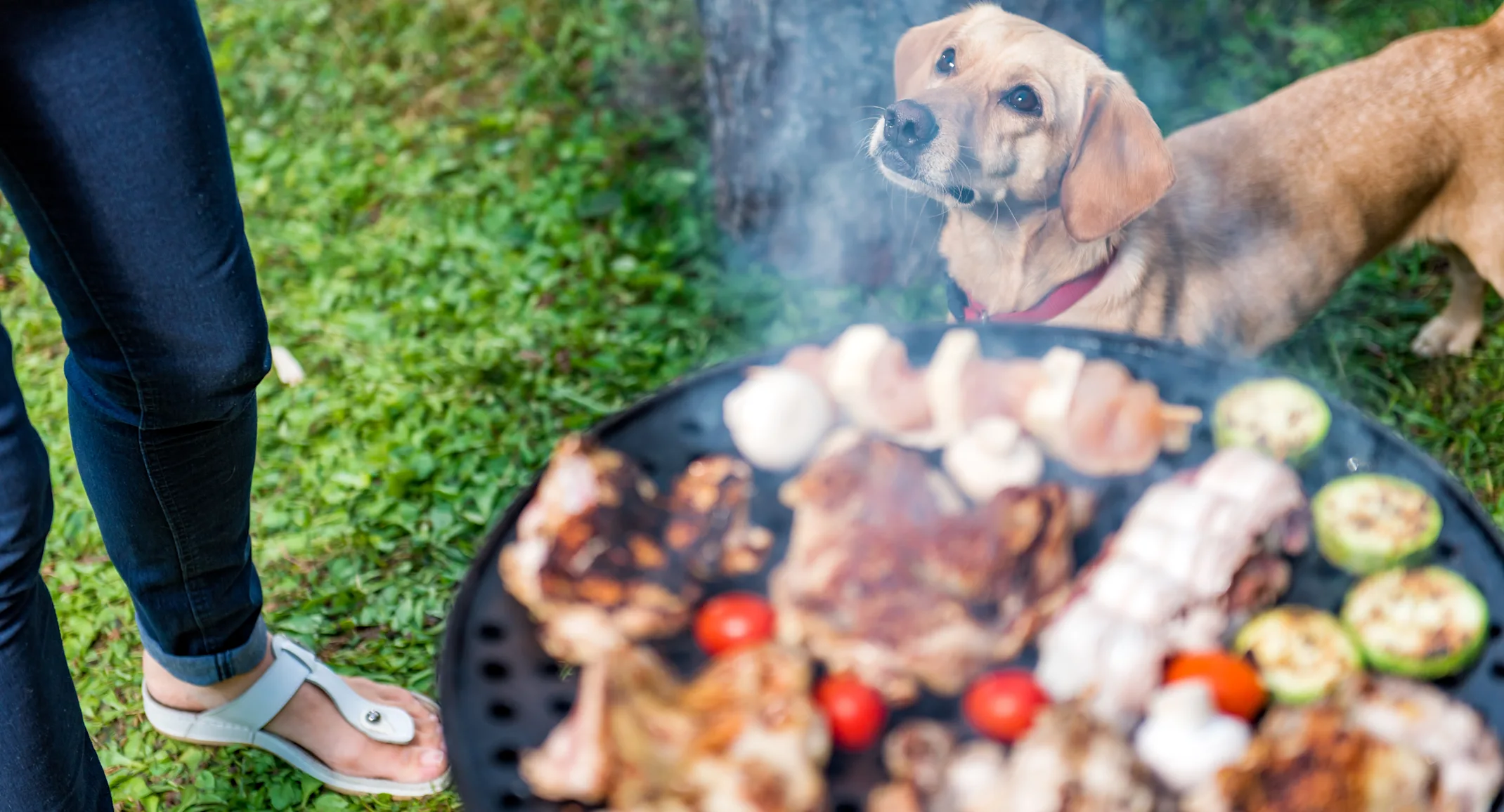4 Simple Tips for Labor Day Pet Safety
Tips and Tricks

#1: Keep pets away from the grill
Grilling meat’s mouthwatering aroma entices curious—and hungry—pets, but their interest can lead to serious harm, so ensure they keep at least three feet from a lighted grill. Grill dangers for pets include:
Burns — A pet can suffer a serious burn if they come into contact with a grill’s hot coals or flame.
Smoke inhalation — Grill smoke can seriously irritate a pet’s sensitive airways.
Ingesting inappropriate food — Closely monitor your pet during an outdoor gathering to prevent them from sneaking a tasty food morsel off the grill. Never leave the grill unattended, because your pet can snatch food and other items that could cause illness, including:
Fat drippings — If your pet laps up oily fat drippings, they can develop pancreatitis (i.e., pancreas inflammation).
Charcoal — Most charcoal is non-toxic to pets, but some brands contain fire accelerants, such as lighter fluid, which can be toxic. In addition, charcoal is made from partially burned wood, and can cause your pet digestive issues. If your pet swallows a large charcoal piece, the material can lodge in their throat, stomach, or intestine, and lead to a dangerous obstruction. If your pet ingests coal that is still hot inside, the briquette can burn their gums, mouth, tongue, and esophagus.
#2: Resist sharing food with pets
Although your pet may look longingly at the barbecue foods on your plate, refrain from sharing any tasty morsels with them, and ask guests to do the same. Your Labor Day gathering will likely include an abundance of delicious food and plenty of new people, but prevent your pet from begging or sneaking table foods that could cause problems, such as:
Bones —Avoid giving your pet any bones, as they can easily splinter and lodge in their teeth or throat, or puncture their intestinal tract. Ask guests to throw away all bones in a secure garbage can when finished.
Corn on the cob — If your pet swallows a corn cob section, the piece can cause them to have an intestinal blockage that may require surgical removal. Put corn cobs right in the trash, along with bones.
Dip — Many common dips contain ingredients, such as onions, garlic, and avocados, that are toxic to pets. Keep dips and party trays up high, and out of your pet’s reach.
Fruit salads — Fruit salads are a healthy and delicious snack for humans, but some fruits, such as grapes, can be toxic to pets. Grape toxicity is linked to kidney damage, and can result in sudden kidney failure, and death. Keep grape products, such as raisins, juices, jelly, and jam, away from pets.
Dessert — What’s a party without dessert? Dessert is delicious, but potentially dangerous for pets. Chocolate is toxic to your pet, and if they ingest this ingredient, they can experience vomiting, diarrhea, abdominal pain, rapid heartbeat, tremors, and seizures. Xylitol, a natural sugar substitute commonly used in baked goods, is also toxic, and can cause your pet liver failure, and death.
#3: Protect your pet from overheating
Summer is winding down, but the temperatures can still be brutal. High heat and humidity can be hazardous to pets, especially those who are obese, brachycephalic (i.e., flat-faced), elderly, or have a medical condition. Closely monitor your pet for heatstroke signs, which may include:
Excessive panting
Excessive drooling
Dry, red gums
Vomiting
Diarrhea
Mental confusion
Collapse
If your pet exhibits overheating signs, quickly move them to a cool, well-ventilated area and offer water—but, do not force them to drink. Take their temperature, and use lukewarm—not cold—water and wet towels to cool them. Point a fan at them to help promote cooling. After cooling your pet at home, take them to an emergency veterinary hospital as soon as possible to ensure they have experienced no internal damage.
#4: Avoid setting off fireworks around pets
Fireworks can be a fun way to celebrate, but they can terrify your pet, causing them extreme stress and anxiety, especially if they are noise averse. If fireworks are a part of your Labor Day celebration, keep your pet indoors in a quiet, secure place, such as in a crate or bedroom. Provide your pet with interactive toys to distract them from the sharp, booming sounds outside, and play calm music or the television for background noise. If your pet is extremely anxious or fearful, your veterinarian can prescribe a mild sedative or antianxiety medication.
While taking these precautions can help keep your pet safe this Labor Day, the unexpected can happen. If your pet experiences a medical emergency during the holiday weekend, use this locator to find a veterinary practice in your community, and immediately contact a local veterinarian.
